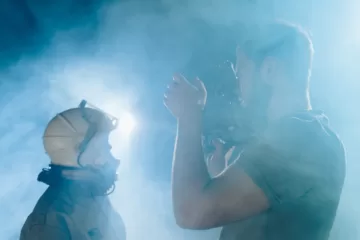5 Acting Tips for an Actor

Acting in a film can be a rewarding and fulfilling experience, but it can also be challenging. Whether you’re a seasoned actor or new to the industry, here are 5 acting tips for an actor in a film:

Know your character:
To portray your character effectively, it’s important to fully understand their background, motivations, and personality. Spend time researching and developing your character so that you can embody them authentically on screen.
- Read the script carefully. The script is your first and most important source of information about your character. Take the time to read it through several times, paying attention to every detail. This includes the character’s name, age, appearance, occupation, relationships, and any other relevant information.
- Talk to the director. The director is the one who will ultimately decide how your character should be portrayed. Once you have a good understanding of the character from the script, talk to the director about their vision for the role. This will help you to narrow down your interpretation and create a performance that is in line with the director’s vision.
- Do your research. In addition to the information in the script, you may also want to do some research on your character’s background. This could involve reading books or articles about the time period in which the film is set, or interviewing people who have similar experiences to your character. The more you know about your character, the more authentic your performance will be.
- Develop your character’s backstory. Once you have a good understanding of your character’s current circumstances, it’s also helpful to develop their backstory. This will give you a deeper understanding of who they are and why they act the way they do. You can do this by brainstorming ideas, writing a short story, or even creating a character profile.
- Find the character’s emotional core. Every character has an emotional core, which is the driving force behind their actions. Once you understand your character’s emotional core, you can use it to inform your performance. For example, if your character is motivated by fear, you might make them speak quickly and nervously. Or, if your character is motivated by love, you might make them speak slowly and deliberately.
Listen and react:
Acting is not just about delivering lines; it’s also about reacting to your scene partner’s performance. Listen carefully to your scene partner and react authentically in the moment. This will help to create a more natural and engaging performance.
- Pay attention to your scene partner’s body language and facial expressions. These can often tell you more about what they are thinking and feeling than their words.
- Don’t be afraid to improvise. If something unexpected happens during a scene, don’t be afraid to go with it. This can often lead to more natural and realistic reactions.
- Be present in the moment. Don’t think about your lines or what you are going to say next. Just focus on your scene partner and react to what they are doing and saying.
- Trust your instincts. If you feel like a reaction is right, even if it’s not what you had planned, go with it. Your instincts are often a better guide than your conscious mind.
- Have fun! Acting should be enjoyable. If you are not having fun, it will show in your performance. So relax, take a deep breath, and enjoy the process.
Take direction:
The director is there to help guide your performance and bring the best out of you. Be open to their suggestions and take direction willingly. This will not only improve your performance but also make you a more collaborative member of the team.
- Remember that the director is the boss. They are the ones who are responsible for the overall look and feel of the film, and they have the final say on how your character should be portrayed.
- Be open to feedback. The director may have different ideas about how your character should react in certain scenes. Be willing to listen to their suggestions and try new things.
- Don’t be afraid to ask questions. If you don’t understand something, or if you have a different interpretation of the scene, ask the director for clarification.
- Be professional. Even if you don’t agree with the director’s direction, it’s important to be professional and respectful. Remember that they are the ones who are ultimately responsible for the film.
- Be a team player. Acting is a collaborative art form. Be willing to work with the other actors and crew members to create the best possible film.
Be present in the moment:
It’s important to be fully present at the moment while acting. Don’t worry about what you’re going to do next or how you’re going to deliver a certain line. Instead, focus on the present moment and allow your instincts to guide you.
- Meditate. Meditation can help you to develop your focus and concentration. This can be helpful in staying present in the moment while acting.
- Do breathing exercises. Breathing exercises can help you to relax and center yourself. This can also be helpful in staying present in the moment.
- Focus on your senses. When you are acting, try to focus on your five senses. What do you see, hear, smell, taste, and feel? This can help you to stay grounded in the present moment.
- Listen to your scene partner. When you are acting, focus on listening to your scene partner. This will help you to stay in the moment and react authentically to their performance.
- Don’t overthink it. One of the biggest mistakes actors make is overthinking their performance. When you overthink, you start to lose your focus and your performance becomes forced. Instead, try to relax and let your instincts guide you.
- Trust yourself. You are the only one who can bring your character to life. So trust yourself and let your unique perspective shine through.
Practice, practice, practice:
Practice is essential for honing your acting skills. Take classes, rehearse scenes with other actors, and practice your craft on your own. The more you practice, the more comfortable and confident you’ll feel when it’s time to perform on set.
- Practice makes perfect. The more you practice, the better you will become at acting. This is true for any skill, but it is especially true for acting.
- Practice helps you to develop muscle memory. When you practice a scene or a monologue over and over again, your body and mind start to remember the movements and the words. This makes it easier to perform the scene or monologue when you are on set.
- Practice helps you to overcome your fears. Acting can be scary, especially if you are new to it. But the more you practice, the more comfortable you will become with the process. This will help you to relax and deliver more natural performances.
- Practice helps you to develop your own unique style. As you practice, you will start to develop your own unique style as an actor. This is what will make you stand out from the crowd.
- Practice helps you to build confidence. The more you practice, the more confident you will become in your abilities as an actor. This confidence will show in your performances and make you more believable.
Additional Tips
Here are some additional tips for aspiring film actors who want to practice their craft:
- Find a scene or monologue that you love and practice it over and over again. You can find scenes and monologues online or in books.
- Rehearse with other actors. This is a great way to get feedback and learn from other actors.
- Record yourself performing and watch it back. This can help you to identify areas where you can improve.
- Get feedback from your acting teacher or another experienced actor. This can be invaluable in helping you to identify areas where you can improve and develop your skills.
- Don’t be afraid to experiment. Try different things and see what works for you. There is no right or wrong way to act.
- Have fun! Acting should be enjoyable. If you are not having fun, it will show in your performances. So relax, take a deep breath, and enjoy the process.
Practice is essential for any actor who wants to improve their skills and achieve their goals. By following these tips, you can make the most of your practice time and develop into a better actor.
In conclusion, acting in a film requires preparation, collaboration, and a willingness to be fully present at the moment. By knowing your character, listening and reacting authentically, taking direction, being present at the moment, and practicing your craft, you can deliver a compelling and engaging performance that will resonate with audiences.
Thanks for reading this article and welcome in the film acting world. Please connect with us on Instagram and direct message for any query.
You can visit Film Riot for more information.



0 Comments